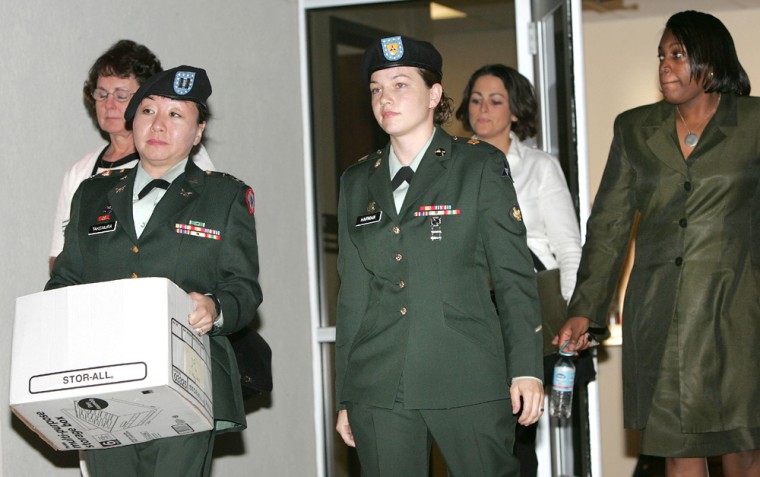A military jury on Monday convicted the second soldier to be tried in the Abu Ghraib prison scandal, returning guilty verdicts on all but one of the seven charges she faced for her role in the abuse of Iraqi inmates.
A panel of four Army officers and four senior enlisted soldiers convicted Spc. Sabrina Harman on one count of conspiracy to maltreat detainees, four counts of maltreating detainees and one count of dereliction of duty.
The 27-year-old reservist from Lorton, Va., was acquitted on one maltreatment count that accused her of photographing a group of Iraqi detainees who were forced to masturbate in public by Abu Ghraib guards. One of Harman’s co-defendants testified last week that she was not present when that incident occurred.
The jury also found that Harman did not commit two of the nine acts that were part of the dereliction charge, but she was convicted of the overall offense.
Jurors deliberated for about 3½ hours before returning their decision. Harman showed no reaction while the jury foreman read each of the verdicts. She left the building without speaking to reporters.
Faces 5 1/2 years
Her sentencing hearing was scheduled to begin Tuesday. Harman faces a maximum of 5½ years in a military prison.
Harman, a former pizza shop manager from Virginia, was the second soldier to be tried for allegedly mistreating prisoners at Abu Ghraib. She was depicted in several of the most notorious photos taken at Abu Ghraib in late October and early November 2003, and she is accused of taking other pictures.
Harman posed for a photo with Pvt. Charles Graner Jr. behind a group of naked detainees stacked in a pyramid. In another photo, she was shown with a prisoner on whose leg she is accused of writing “rapeist.”
Earlier Monday, prosecutors said in closing arguments that Harman and other guards on the night shift at Abu Ghraib conspired to mistreat the prisoners.
“They were all acting together for their own amusement,” said Capt. Chris Graveline. “There was no justification for what they did that night.”
Graveline said the group took pictures of what they were doing “so they could remember that night, so they could laugh again at these men. ... There’s nothing funny about what happened at Abu Ghraib.”
Virtually no training
Defense lawyer Frank Spinner said Harman was a novice soldier who had no prison guard experience and who received virtually no training before going to work at the chaotic and overcrowded prison as part of the Maryland-based 372nd Military Police Company.
“Shame on the Army for putting an ill-equipped, ill-trained junior specialist in a position where she had to challenge her (enlisted) leadership to do the right thing,” he said after putting on a case that lasted only a few hours. “This is not one of the Army’s finest moments.”
The final witness was Kelly Bryant, Harman’s roommate in Virginia, who read part of a letter Harman wrote home in late October 2003.
In the letter, Harman said she took pictures of detainee abuse at Abu Ghraib because she was opposed to the treatment and wanted to document the wrongdoing.
“At first I thought it was funny, but these people are going too far,” Harman wrote. “Kelly, it’s awful. I thought I could handle anything, but I was wrong.”
Harman said in the letter that her initial amusement at how the detainees were mistreated gave way to the realization that her co-defendants were engaged in illegal activity.
“It hit me it was a form of molestation — you can’t do that,” she wrote. “What if that was me in their shoes?”
Six co-defendants in the Abu Ghraib case have made plea bargains. Graner was convicted in January and is now serving a 10-year sentence in an Army prison.
Pfc. Lynndie England, the most recognizable Abu Ghraib defendant, also reached a plea deal, but the judge threw it out in early May after Graner’s testimony contradicted England’s assertion that she knew her actions were wrong.
